8A Unit 1 Friends Grammar(共17张PPT)
文档属性
| 名称 | 8A Unit 1 Friends Grammar(共17张PPT) | 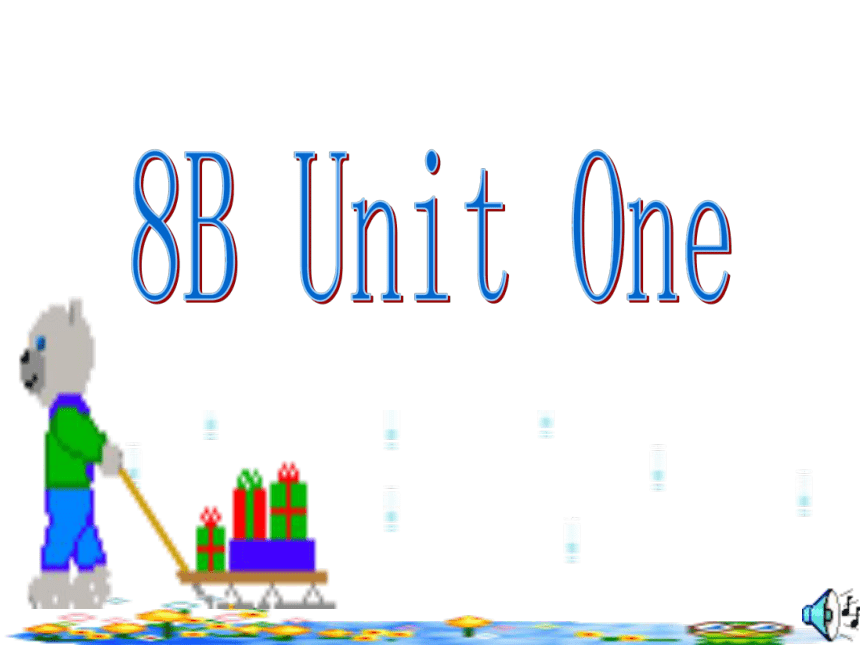 | |
| 格式 | zip | ||
| 文件大小 | 213.8KB | ||
| 资源类型 | 教案 | ||
| 版本资源 | 牛津译林版 | ||
| 科目 | 英语 | ||
| 更新时间 | 2014-09-07 21:30:39 | ||
图片预览

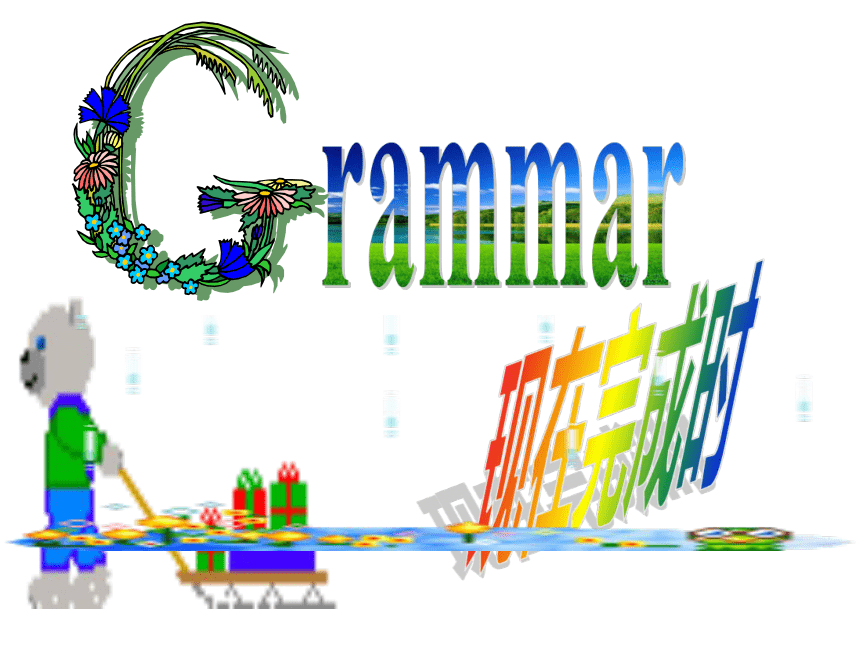
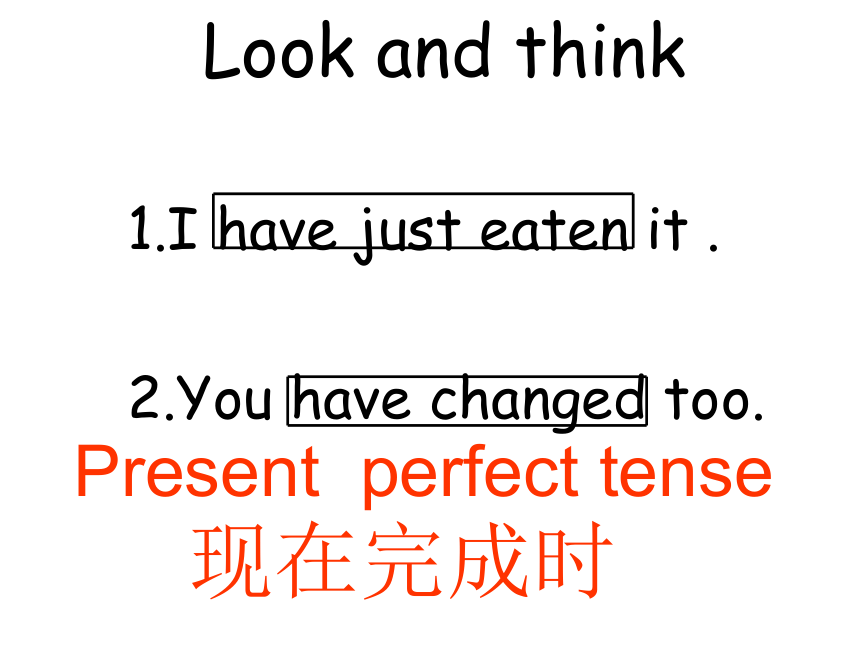
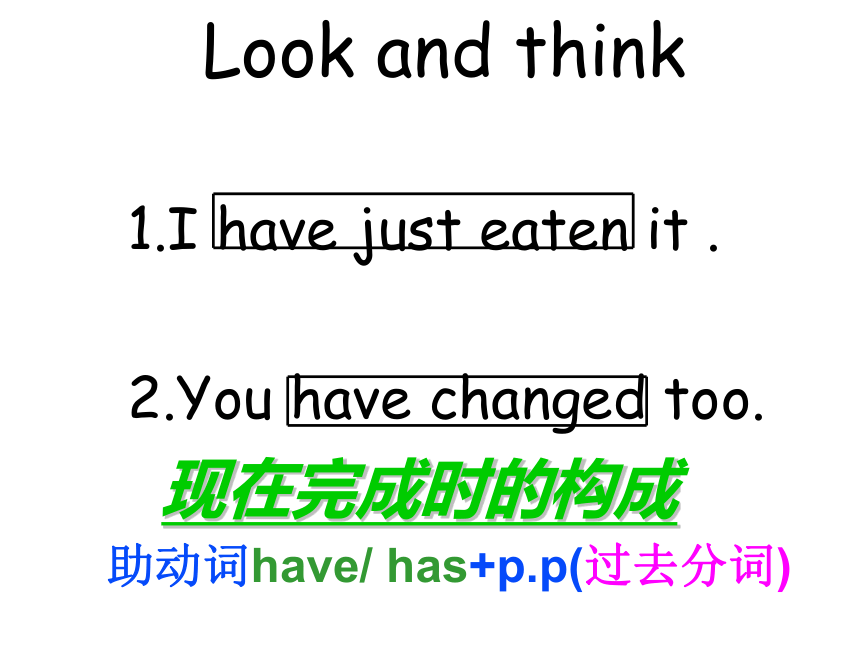
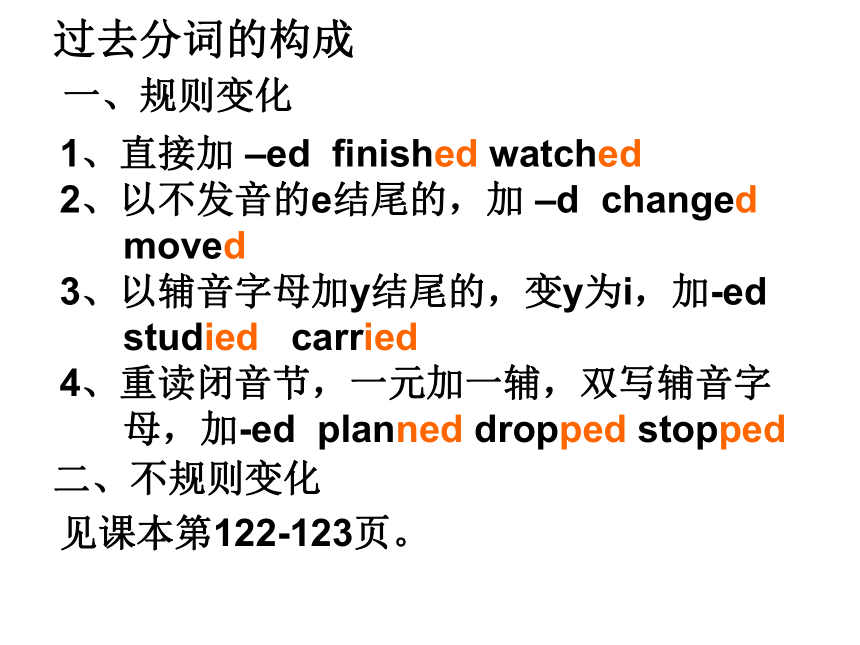
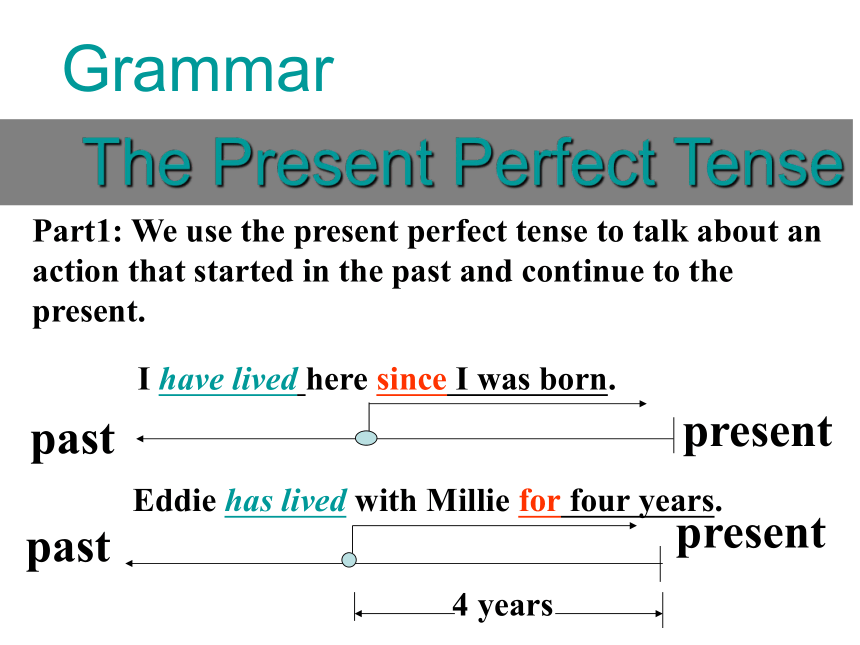
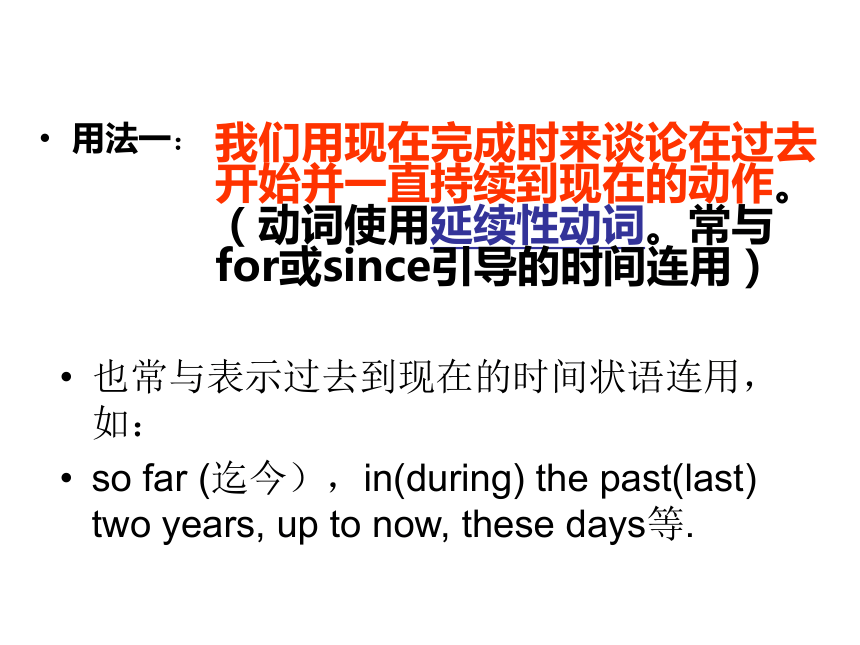
文档简介
课件17张PPT。8B Unit One现在完成时rammarLook and think1.I have just eaten it .2.You have changed too.Present perfect tense现在完成时Look and think1.I have just eaten it .2.You have changed too. 现在完成时的构成助动词have/ has+p.p(过去分词)过去分词的构成一、规则变化1、直接加 –ed finished watched
2、以不发音的e结尾的,加 –d changed
moved
3、以辅音字母加y结尾的,变y为i,加-ed
studied carried
4、重读闭音节,一元加一辅,双写辅音字
母,加-ed planned dropped stopped二、不规则变化见课本第122-123页。GrammarThe Present Perfect TensePart1: We use the present perfect tense to talk about an action that started in the past and continue to the present.
I have lived here since I was born.
Eddie has lived with Millie for four years.
past4 yearspresent用法一:
我们用现在完成时来谈论在过去开始并一直持续到现在的动作。(动词使用延续性动词。常与for或since引导的时间连用)
也常与表示过去到现在的时间状语连用,如:
so far (迄今),in(during) the past(last) two years, up to now, these days等.Part 2: We use the present perfect tense to talk about an action that happened in the past and has a connection with the present.
past present
Eddie has just eaten Hobo’s food.
(Eddie ate the food, and now Hobo has nothing to eat.) 用法二:
我们用现在完成时态来谈论过去发生且和现在仍有联系的动作。
e.g. 1.He has turned off the light.
他已把灯关了。
( 动作结束于过去,但说明的是现在的情
况--灯现在不亮了。)
2.She has gone.
她走了。 (动作是过去发生的,而对现在所造成的
结果是她不在这里了。)
可用短暂性动词做谓语动词.如arrive, get, finish, borrow, open, stop, begin, go, come, die, fall, …
时间状语常用already, just, yet, ever, never, once( 一次),recently, still 等 不具体的过去时间或不带有时间状语。
注意:
Part 3: We also use the present perfect tense to talk about how many times an action has happened till now.
I have already read this book many times.
用法三:
我们也用现在完成时来谈论动作到现在已经发生过多少次了。
①肯定形式。
主语+ have/has+ 过去分词+….
e.g.
I have done my homework?????
?? She has gone to her school. ????
②否定形式。
主语+ have/has+ not+过去分词+….
(在助动词have/has后+not,可缩写为haven’t/hasn’t)
e.g.
? I haven’t done my homework. ? ?????????
???? She hasn’t gone to her school. 现在完成时的基本句型
③一般疑问句形式及其答语。
Have/Has+主语+过去分词+…?
肯定回答:
Yes , 主语+ have/has.
否定回答:
No , 主语+ haven’t/hasn’t.
e.g.
-Has she gone to her school?
-Yes, she has?.
? ( No, she hasn’t.)
完成书后练习p14句型转换按要求改写下面的句子 1. Mr. and Mrs. Li have come back.(改为否定句)
2. John has played this computer game
a few times.(改为否定句)
3. We have seen that film.
(改为一般疑问句,并做否定回答)
4. Mr. Dong has repaired over ten bikes
since last Monday. (改为否定句)
5. They have learned around five units.(提问)
6. They have already finished their homework.
(改为一般疑问句,并做肯定回答)
1. Mr. and Mrs. Li have come back.(改为否定句)
Mr. and Mrs. Li haven’t come back.
2. John has played this computer game
a few times.(改为否定句)
John hasn’t played this computer game a few times.
3. We have seen that film.
(改为一般疑问句,并做否定回答)
Have you seen that film?
No, we haven’t.
4. Mr. Dong has repaired over ten bikes
since last Monday. (改为否定句)
Mr. Dong hasn’t repaired over ten bikes since last Monday.
5. They have learned around five units.(提问)
What have they done?
6. They have finished their homework.
(改为一般疑问句,并做肯定回答)
alreadyHave they finished their homework
yet?
Yes, they have.
2、以不发音的e结尾的,加 –d changed
moved
3、以辅音字母加y结尾的,变y为i,加-ed
studied carried
4、重读闭音节,一元加一辅,双写辅音字
母,加-ed planned dropped stopped二、不规则变化见课本第122-123页。GrammarThe Present Perfect TensePart1: We use the present perfect tense to talk about an action that started in the past and continue to the present.
I have lived here since I was born.
Eddie has lived with Millie for four years.
past4 yearspresent用法一:
我们用现在完成时来谈论在过去开始并一直持续到现在的动作。(动词使用延续性动词。常与for或since引导的时间连用)
也常与表示过去到现在的时间状语连用,如:
so far (迄今),in(during) the past(last) two years, up to now, these days等.Part 2: We use the present perfect tense to talk about an action that happened in the past and has a connection with the present.
past present
Eddie has just eaten Hobo’s food.
(Eddie ate the food, and now Hobo has nothing to eat.) 用法二:
我们用现在完成时态来谈论过去发生且和现在仍有联系的动作。
e.g. 1.He has turned off the light.
他已把灯关了。
( 动作结束于过去,但说明的是现在的情
况--灯现在不亮了。)
2.She has gone.
她走了。 (动作是过去发生的,而对现在所造成的
结果是她不在这里了。)
可用短暂性动词做谓语动词.如arrive, get, finish, borrow, open, stop, begin, go, come, die, fall, …
时间状语常用already, just, yet, ever, never, once( 一次),recently, still 等 不具体的过去时间或不带有时间状语。
注意:
Part 3: We also use the present perfect tense to talk about how many times an action has happened till now.
I have already read this book many times.
用法三:
我们也用现在完成时来谈论动作到现在已经发生过多少次了。
①肯定形式。
主语+ have/has+ 过去分词+….
e.g.
I have done my homework?????
?? She has gone to her school. ????
②否定形式。
主语+ have/has+ not+过去分词+….
(在助动词have/has后+not,可缩写为haven’t/hasn’t)
e.g.
? I haven’t done my homework. ? ?????????
???? She hasn’t gone to her school. 现在完成时的基本句型
③一般疑问句形式及其答语。
Have/Has+主语+过去分词+…?
肯定回答:
Yes , 主语+ have/has.
否定回答:
No , 主语+ haven’t/hasn’t.
e.g.
-Has she gone to her school?
-Yes, she has?.
? ( No, she hasn’t.)
完成书后练习p14句型转换按要求改写下面的句子 1. Mr. and Mrs. Li have come back.(改为否定句)
2. John has played this computer game
a few times.(改为否定句)
3. We have seen that film.
(改为一般疑问句,并做否定回答)
4. Mr. Dong has repaired over ten bikes
since last Monday. (改为否定句)
5. They have learned around five units.(提问)
6. They have already finished their homework.
(改为一般疑问句,并做肯定回答)
1. Mr. and Mrs. Li have come back.(改为否定句)
Mr. and Mrs. Li haven’t come back.
2. John has played this computer game
a few times.(改为否定句)
John hasn’t played this computer game a few times.
3. We have seen that film.
(改为一般疑问句,并做否定回答)
Have you seen that film?
No, we haven’t.
4. Mr. Dong has repaired over ten bikes
since last Monday. (改为否定句)
Mr. Dong hasn’t repaired over ten bikes since last Monday.
5. They have learned around five units.(提问)
What have they done?
6. They have finished their homework.
(改为一般疑问句,并做肯定回答)
alreadyHave they finished their homework
yet?
Yes, they have.
